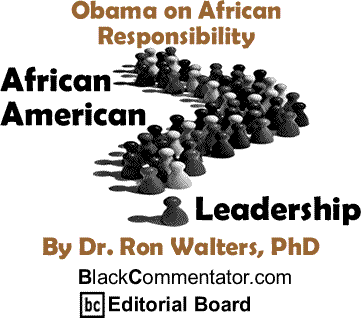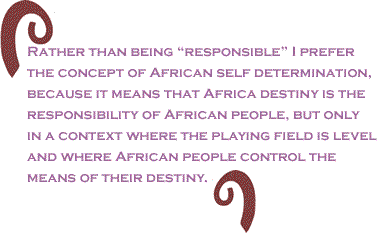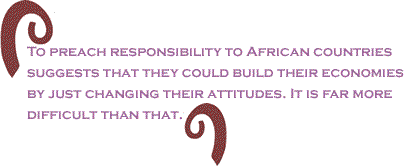
|
|||||||||||||||||||||||

|
|

Custom Search
|
|
 |
|
| I was happy to see President Barack Obama travel to Africa in the first year of his Administration and his praise for the progress of Ghana seemed to be a vehicle to elevate the position of Africa in his foreign policy. But listening to his speech to the Ghanian Assembly, in his analysis of the route to progress, I was also struck by the re-emergence of the theme of responsibility, similar to his speeches before African American audiences. It seems to be a theme that paralyzes black criticism and plays well with whites who believe that the irresponsibility of blacks - and their African kin – is the major reason for their failure to achieve equality with other nations. He proposed African corruption as the other theme that also plays well as a reason for the lack of African progress. But corruption is not confined to Africa, so if that were the major factor few countries anywhere would have experienced sufficient progress. Acknowledging that corruption is a problem in Africa, especially in places such as Nigeria which as vast oil wealth, for most states in Africa the human resources taken through the “door of no return” and the financial pillage since then has led to it’s persistent poverty as the major factor. Such drastic poverty carries with the accompanying problems of disease, low education, lack of country infrastructure, malnutrition and etc.
So, to preach responsibility to African countries suggests that they could build their economies by just changing their attitudes. It is far more difficult than that. They must begin to build on the fruits of Continental trade at home, but African countries have similar baskets of goods which reduces the incentive for trade where the financial returns would be low. Fundamentally, individual African countries cannot face the international system by themselves where globalization is re-shaping economics by the emergence of regional economic structures. The European Union is such an emerging formidable institution, the United States has NAFTA and CAFTA, and Asian trade is greater among Asian countries than between them and the rest of the globe – with the sole exception of China. With this structure, how can small – or even larger African countries - hope to compete and bring in the kinds of revenue that can help support a nation.
At the end of July, the Africa Union, together with the Government of Senegal is sponsoring a conference on how to continue to construct the United States of Africa. The Unity of the African continent is the only hope for economic development in a world of regional economic dominance. If this is what people mean by “exercising responsibility” then we are on the same page, but somehow, I don’t think so. I think they are fine with African countries continuing to accept international financial assistance and laying their markets at the feet of American, European or Chinese interests through trade deals like the African Growth and Opportunity Act. You can tell by the howls that go up when African governments attempt to take over control of their natural resources and market them for the good of their own peoples.
BlackCommentator.com Editorial Board member Dr. Ron Walters is the Distinguished Leadership Scholar,
Director of the African American Leadership Center and Professor
of Government and Politics at the University of Maryland College
Park. His latest book is: The Price of Racial Reconciliation (The Politics of Race and Ethnicity)
|
|
Any BlackCommentator.com article may be re-printed so long as it is re-printed in its entirety and full credit given to the author and www.BlackCommentator.com. If the re-print is on the Internet we additionally request a link back to the original piece on our Website. Your comments are always welcome. eMail re-print notice
If you send us an eMail message we may publish all or part of it, unless you tell us it is not for publication. You may also request that we withhold your name. Thank you very much for your readership. |
|
| |
|
| July
16, 2009 Issue 333 |
|
| Executive Editor: Bill Fletcher, Jr. |
| Managing Editor: Nancy Littlefield |
| Publisher: Peter Gamble |
| Est. April 5, 2002 |
Printer Friendly Version
in resizeable plain
text format or pdf
format. |
| Frequently Asked Questions |
 |

|
 |
 |
 |
| |
| |






































